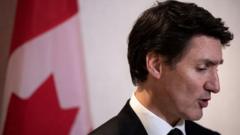Canadian Prime Minister Justin Trudeau has firmly stated that Canada has no interest in becoming the 51st state of the United States. During an interview with former White House press secretary Jen Psaki on MSNBC's "Inside," Trudeau responded to President-Elect Donald Trump’s provocative remarks suggesting the possibility of Canadian annexation. "It's not going to happen," he declared emphatically.
Trump has recently elevated the rhetoric surrounding this issue, often referring to the "artificially drawn line" between Canada and the U.S., with implications that a merger could bolster national security. He has even mockingly dubbed Trudeau as "Governor Trudeau," evoking the titles of U.S. state leaders. However, Trudeau brushed off these comments, stating that he prioritizes substantive issues over personal jabs. "If I was that thin-skinned, I probably wouldn't last long in politics," he remarked.
Canada’s identity crisis is a significant part of Trudeau’s rebuttal, as he noted that many Canadians define themselves distinctly as "not Americans." He recently articulated his position more bluntly, declaring that the likelihood of the two nations merging is akin to having "a snowball's chance in hell."
The Prime Minister has emphasized that Canadians take immense pride in their independence, and according to him, citizens are more concerned about the implications of potential tariffs on goods between the countries. These tariffs, proposed at 25%, could lead to significant economic repercussions for both nations. Trudeau highlighted, "No American wants to pay 25 percent more for electricity or oil and gas coming in from Canada."
On a related note, Alberta Premier Danielle Smith recently met with Trump at his Mar-a-Lago estate, discussing vital energy partnerships, as Alberta stands out as a key oil and gas exporter. The ongoing discussions regarding trade, tariffs, and energy cooperation illustrate the complexities of the U.S.-Canada relationship amidst political rhetoric and national pride.






















